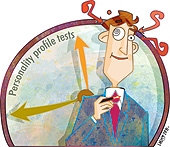 |
If you are a reader of detective fiction, one of the tools of the trade you will be familiar with is profiling. Even before it became a formal discipline, folks like Sherlock Holmes and Hercule Poirot indulged in it to some extent. Today, of course, the experts look at the nature of the crime and very confidently tell you that the perpetrator is male, maladjusted, malevolent and must have been sexually molested as a child.
Profiling has become a part of the jobseeker’s world too. It has taken two divergent directions. First, it has become sophisticated. At job interviews — and even during annual assessments — elaborate profiling tools are rolled out. (The other side of the picture, of course, is that you profile the jobs themselves to find out what sort of a person you need.)
The second — and more interesting — mutation of profiling is a sort of dumbing down. On the Internet, you will find hundreds of sites which tell you what sort of a person you are and what sort of a job will suit you. Some of these are designed to attract traffic to the sites and may compromise on usefulness. One of the best such sites is the Guardian People Profiler, flagged off in 2006. It’s upfront about its intentions. “Our People Profiler campaign is a national survey of working attitudes created for The Guardian. The campaign’s objective: To build a rapport with UK workers so that when the time came to look for new employment, they would use Guardian Jobs.” All you have to do is answer 24 multiple-choice questions. This measures your “attitude, personality and social role within the workplace”. Each test creates a unique creature — made up of attributes like Mother Hen, Dreamer, Stress Lover, Mercenary or Mr Big. Two other features of the People Profiler are the Town and the Map. The Town is “a virtual home for all the creatures that have been generated by people who take the test. By bringing the creatures together, this ‘town’ provides a peek at the personality types on an industry-by-industry basis, and compares the kind of people who are found in various sectors”. The Map is also a broad-brush picture. “Which region has the highest levels of Stress Lovers? Where do the Mother Hens congregate? The map shows users how their current sector and region measure up when it comes to things like job satisfaction and anxiety levels.”(On the Net, they are arguing about whether Mother Hen is appropriate for a male. The alternatives: Father Hen and Father Rooster.)
“These fun and games are all very fine in context,” says Mumbai-based HR consultant Shashi Rao. “But they tend to devalue the real thing. I have administered the TAT (thematic apperception test), which is basically asking a candidate to look at a picture and tell a story. People who have been exposed to these pop culture personality tests treat the TAT as a joke.”
Psychological assessments have a long history. They started in China around 1370 AD. Their next destination was India around 1830 and Europe some 20 years later. They were used for selecting candidates for civil service jobs.
“In today’s world they are becoming increasingly important,” says Rao. “First, jobs are becoming more demanding and skill specific. Second, the number of job applicants is huge. Third, the cost of making the wrong choice is becoming unaffordable. It is for both individuals and companies to know themselves and their needs.”
Mother Hens and their ilk had better watch out: If they are cast as father figures, they will end up with egg all over their face.
Personality Profile
A personality profile is a knowledge management tool used to provide an evaluation of an employee’s personal attributes, values and life skills in an effort to maximise his or her job performance and contribution to the company.
Questions in a personality profile test, which can be taken traditionally or online, are designed to seek information about an employee’s temperament, decision-making methods, communication style and general attitude towards work and recreation. The information is used to match the right employee to the right project or task, especially when group work or telecommuting is involved. There are two generally accepted categories of personality profile tests — trait and type. Trait personality profile tests, such as Orpheus, 16 PF, and OPQ, operate on the assumption that personality is made up of a number of characteristics. The goal of the test is to document the employee’s characteristics and match the characteristics to appropriate roles within the company. Type personality profile tests, such as Myers-Briggs, Insights Discovery, and the Keirsey Temperament Sorter, propose that people fall into well-defined categories. The goal of the test is to identify the category the employee belongs to, share the information and build team skills by having team members become aware of the talents associated with each category.
(Source: Whatis.com)











